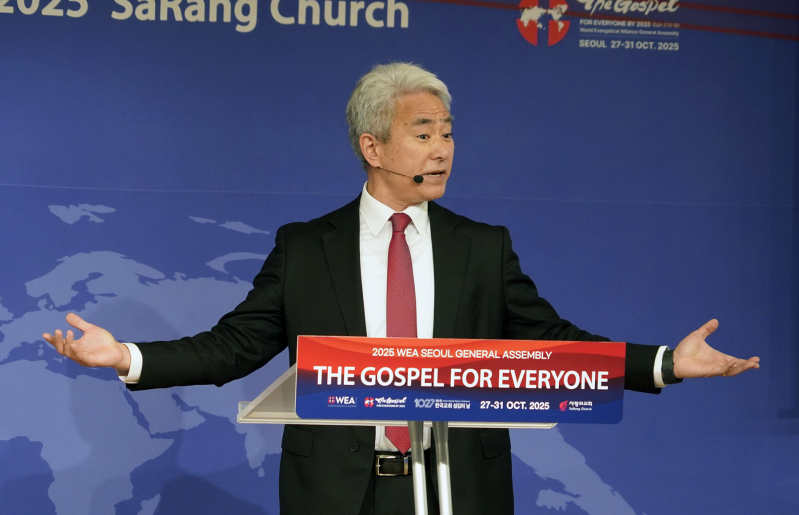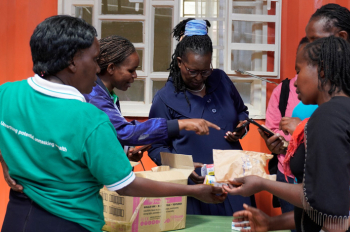
On the third morning of the World Evangelical Alliance (WEA) General Assembly in Seoul, Rev. Dr. Walter Kim, President of the National Association of Evangelicals (NAE) in the United States, delivered a deeply personal devotional message about the reconciling power of the gospel amid the turmoil of the modern world.
Kim began by recalling a prayer he made 21 years ago, when his daughter Naomi was born with an intellectual disability and severe medical complications. “I was in the hospital sitting next to her incubator as she was connected to tubes,” he said. “I couldn’t touch her. In the early weeks of life, I merely touched the plastic that separated us and prayed that God would fill her lungs and pulse blood through her veins.”
He shared that he and his wife gave their daughter the middle name Joy, inspired by Nehemiah 8:10: “The joy of the Lord is your strength.” “We began to pray by that incubator that she would receive the joy of the Lord and that she would give the joy of the Lord,” Kim said. Her story, he explained, became a living picture of the gospel — “how God responds to the problem of sin with the gospel of peace to form a people with a missional purpose of reconciling hospitality.”
Kim described the first-century world in which the gospel was born — a time of deep political, cultural, and social instability. “The Roman Empire had caused the greatest mass migration of people known in human history up to that time,” he said. “The empire promised unity, but there were constantly rebellions.”
He drew parallels between that world and the present. “This is our time as well,” Kim said. “Religious pluralism, urbanization, mass migration, economic upheaval, multiculturalism, breakdown of old worldviews — you name it. The gospel must be proclaimed into tumultuous times.”
Kim said the greatest problem facing humanity is not external turmoil but sin itself. “Sin separates, shatters and shames,” he said. “It alienates us from God, from one another, and even from ourselves.”
Quoting Romans 7, he said, “The good that I want to do, I don’t do, but I do the very evil that I don’t want to do. We are alienated even within ourselves.”
He explained that Christ’s work on the cross is the ultimate act of reconciliation. “God rescues us,” Kim said. “God responds to this problem of sin that separates and shatters and shames us with the reconciling peace of Christ. Jesus’ body was broken on the cross so that you could be made whole.”
“Peace,” he emphasized, “is not a technique. Peace is not a thing. Peace is a person — the person of Jesus Christ.”
Kim drew from the Apostle Paul’s letter to the Ephesians to illustrate the gospel’s power to unite. He explained that the “dividing wall of hostility” mentioned by Paul referred to literal walls in the Jerusalem temple that separated Gentiles, Jewish women, and Jewish men.
“Herod built a temple with dividing walls of hostility,” Kim said. “Signs were posted that warned Gentiles they could be killed if they crossed them.”
“The gospel,” he continued, “breaks down these walls of hostility. It forms a new people, a new temple — the Church — in which we belong to God and to one another.”
Kim said the essence of the gospel is “one of peace and peacemaking.” “We now belong to God and we belong to each other,” he said. “There is no other option.”
Kim explained that Scripture uses several metaphors to describe this new reality in Christ — social, political, familial, and architectural. “In verse 19, Paul says, ‘You are no longer strangers and aliens,’” he noted. “That is a social metaphor. Then he says, ‘You are fellow citizens with the saints,’ a political metaphor. Then, ‘members of the household of God,’ a family metaphor. And finally, we are built on the foundation of the apostles and prophets — an architectural metaphor.”
“If we are to have a gospel for everyone,” Kim said, “we need a gospel for everything. The gospel should touch every aspect of society — individuals and institutions, personal and public, spiritual and social.”
Kim said the gospel flourishes when believers live out reconciliation in tangible ways. He shared about visiting Malawi, where churches of different denominations were serving together in a predominantly Muslim area through literacy programs, vocational training, early childhood education, and sustainable farming.
“There were 80 children there, most of them Muslim children, memorizing ‘Jesus loves me, this I know,’” Kim said. Local Muslim chieftains, he added, had encouraged their children to attend because of the Church’s work in the community.
He recalled that during the visit, the local chief asked his daughter Naomi to address the villagers. “There was a woman there who had three children with disabilities, and her husband had just left her,” Kim said. “Naomi stood up and said, ‘God loves you. Study hard and learn to read.’ And she added ‘thank you’ in the local language.”
He said that moment reminded him of the prayer he prayed 21 years earlier. “Every person has a place at the table of God. Every person has a call to be on mission,” Kim said. “There is none too great and none too small, not abled or disabled, that in the great economy of God cannot be redeemed.”
“There is no alienation, no separation, no shattering, and no shame that God cannot renew and remake,” he concluded. “And the gospel touches it all.”
Click here for CDI's full reporting from the WEA General Assembly.






